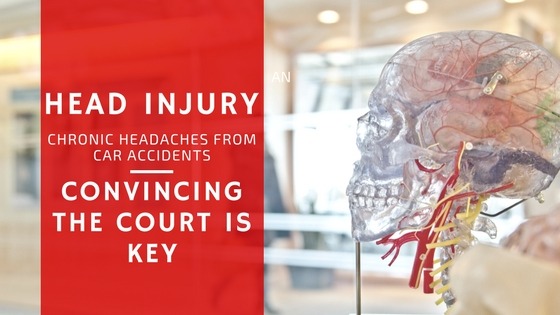Injuries that result from vehicle crashes are many and varied and each one can be unique. To recover your losses from a car accident where another driver was at fault, your damages must be proved to a certainty and not be speculative. Often, injuries to the head or brain are less obvious than other types of injuries and therefore more difficult to prove.
The Nature of Car Accident Injuries
Many injuries are very obvious, and therefore victims typically seek immediate treatment. Cuts, bruises and broken bones, for instance, are among those injuries that are readily apparent. Other injuries do not reveal themselves immediately and may take days or perhaps longer to surface. Such injuries are considered latent, and include whiplash, a very common auto crash injury. Far more serious, however, are injuries that may affect the head and brain of the accident victim.
Traumatic Brain Injury
The Centers for Disease Control and Prevention has sponsored a study of TBI and considers it a major cause of death and disability in the United States. A few relevant facts from the study:
- For the year 2013, there were a total of 2.8 million TBI-related emergency room visits, hospitalizations and deaths.
- The third leading cause of TBI incidents was automobile accidents.
- Motor vehicle crashes were the leading cause of non-fatality TBI in persons age 15-44.
The Nature of TBI
A TBI is caused by some impact or jolt to the head. It may or may not include external physical trauma such as a cut, laceration or bump. Indeed, one of the more insidious aspects of TBI can occur where the brain strikes the inside of the cranium and is damaged by the impact. To be certain, not every TBI is serious. Many are mild, and we often refer to these as concussions. Others, however, are severe and can result in the necessity for long periods of recovery or in the worst case scenario, permanent damage.
Symptoms
Once again, each person experiences unique symptoms, but among the more common for those who have suffered a TBI are:
- Loss of consciousness
- Confusion/disorientation
- Headache, nausea or vomiting
- Drowsiness/fatigue
- Sleep issues
- Dizziness
- Dilated pupils
- Vision issues
- Depression, moodiness
Objective versus Subjective Injuries in Personal Injury Law
Most of the symptoms of TBI are subjective. That is, the proof of their severity is largely based on the victim’s reporting, unlike cuts, bruises and broken bones that can be objectively measured. Certainly a detailed and accurate medical evaluation by a qualified medical professional outlining the injuries is an essential component of the proof necessary in a car accident case, but the credibility of the injured victim is perhaps the key element that will determine the ultimate settlement or award.
Witnesses, typically family members, close friends and co-workers can provide their observations on how the victim has changed since the accident, and this can be very helpful. But ultimately the claims adjuster, jury or judge will look to the victim for evidence of how severe the injuries actually are.
Contact a Personal Injury Attorney for Legal Advice
If you have been injured in a car accident, you have rights. Most importantly, you need to recover as fully as possible from your injuries and receive the compensation you deserve. Call our law offices today at any of our convenient locations and get a free consultation.
Call Us Today
Call our law offices today at any of our convenient locations and get a free consultation.
You can also contact us online by using our quick contact form.











